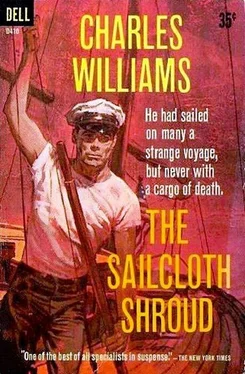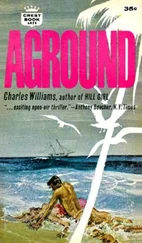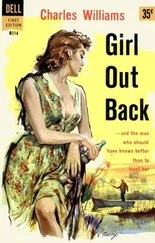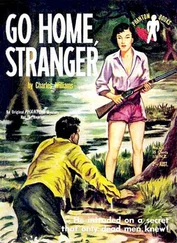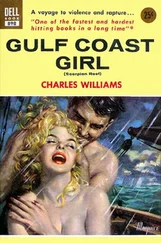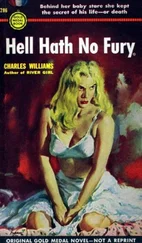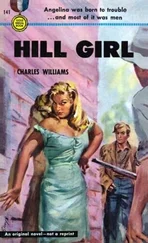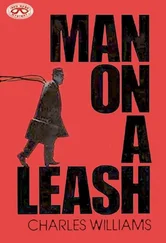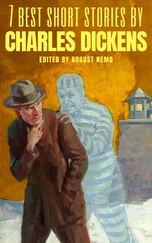Charles Williams - The Sailcloth Shroud
Здесь есть возможность читать онлайн «Charles Williams - The Sailcloth Shroud» весь текст электронной книги совершенно бесплатно (целиком полную версию без сокращений). В некоторых случаях можно слушать аудио, скачать через торрент в формате fb2 и присутствует краткое содержание. Год выпуска: 2010, Жанр: Старинная литература, на английском языке. Описание произведения, (предисловие) а так же отзывы посетителей доступны на портале библиотеки ЛибКат.
- Название:The Sailcloth Shroud
- Автор:
- Жанр:
- Год:2010
- ISBN:нет данных
- Рейтинг книги:3 / 5. Голосов: 1
-
Избранное:Добавить в избранное
- Отзывы:
-
Ваша оценка:
- 60
- 1
- 2
- 3
- 4
- 5
The Sailcloth Shroud: краткое содержание, описание и аннотация
Предлагаем к чтению аннотацию, описание, краткое содержание или предисловие (зависит от того, что написал сам автор книги «The Sailcloth Shroud»). Если вы не нашли необходимую информацию о книге — напишите в комментариях, мы постараемся отыскать её.
The Sailcloth Shroud — читать онлайн бесплатно полную книгу (весь текст) целиком
Ниже представлен текст книги, разбитый по страницам. Система сохранения места последней прочитанной страницы, позволяет с удобством читать онлайн бесплатно книгу «The Sailcloth Shroud», без необходимости каждый раз заново искать на чём Вы остановились. Поставьте закладку, и сможете в любой момент перейти на страницу, на которой закончили чтение.
Интервал:
Закладка:
“I do. I have a very good one. However, you can get rid of me once and for all by answering just one more question. Were you present at his funeral?”
She gasped. “Why did you ask that?”
“I think you know by now,” I said. “There wasn’t any funeral, was there?”
“No.” She leaned forward tensely. “What are you trying to say? That you think he’s still alive?”
“No,” I said. “I’m sorry. He is dead now. He died of a heart attack on the fifth of this month aboard my boat in the Caribbean.”
Her face was pale under the tan, and I was afraid she was going to faint. She didn’t, however. She shook her head. “No. It’s impossible. It was somebody else—”
“What happened in nineteen-fifty-six?” I asked. “And where?”
“It was in Arizona. He went off into the desert on a hunting trip, and got lost.”
“Arizona? What was he doing there?’.’
“He lived there,” she replied. “In Phoenix.”
I wondered if I’d missed, after all, when I’d been so near. That couldn’t be Baxter. He was a yachtsman, a seaman; you couldn’t even imagine him in a desert environment. Then I remembered Music in the Wind . She hadn’t acquired that intense feeling for the beauty of sail by watching somebody’s colored slides. “He wasn’t a native?” I said.
“No. We’re from Massachusetts. He moved to Phoenix in nineteen-fifty.”
Now we were getting somewhere. “Look, Miss Reagan,” I said, “you admitted the description I gave you over the phone could be that of your father. You also admit you have no definite proof he’s dead; he merely disappeared. Then why do you refuse to believe he could be the man I’m talking about?”
“I should think it would be obvious,” she replied curtly. “My father’s name was Clifford Reagan. Not Hardy—or whatever it was you said.”
“He could have changed it.”
“And why would he?” The brown eyes blazed again, but I had a feeling there was something defensive about her anger.
“I don’t know,” I said.
“There are several other reasons,” she went on. “He couldn’t have lived in that desert more than two days without water. The search wasn’t called off until long after everybody had given up all hope he could still be alive. It’s been two and a half years. If he’d found his way out, don’t you consider it at least a possibility he might have let me know? Or do you think the man who died on your boat was suffering from amnesia and didn’t know who he was?”
“No,” I said. “He knew who he was, all right.”
“Then I believe we’ve settled the matter,” she said, starting to get up. “It wasn’t my father. So if you’ll excuse me—”
“Not so fast,” I snapped. “I’m already in about all the trouble one man can get in, and you can’t make it any worse by calling the police and having me thrown in jail. So don’t try to brush me off till we’re finished, because that’s the only way you’re going to do it. I think you’d better tell me how he got lost.”
For a moment I wouldn’t have offered much in the way of odds that she wasn’t going to slap me across the face. She was a very proud girl with a lot of spirit. Then she appeared to get her temper in hand. “All right,” she said.
“He was hunting quail,” she went on. “In some very hilly and inaccessible desert country ninety or a hundred miles southwest of Tucson. He’d gone alone. That was Saturday morning, and he wasn’t really missed until he failed to show up at the bank on Monday.”
“Didn’t you or your mother know where he was?” I asked.
“He and my mother were divorced in nineteen-fifty,” she replied. “At the same time he moved to Phoenix. We were living in Massachusetts. He had remarried, but was separated from his second wife.”
“Oh,” I said. “I’m sorry. Go on.”
“The bank called his apartment, thinking he might be ill. When they could get no answer, they called the apartment-house manager. He said he’d seen my father leave on Saturday with his gun and hunting clothes, but he wasn’t sure where he’d planned to hunt or how long he intended to stay. The sheriff’s office was notified, and they located the sporting-goods store where he’d bought some shells Friday afternoon. He’d told the clerk the general locality he was going to hunt in. They organized a search party, but it was such an immense area and so rough and remote that it was Wednesday before they even found the car. It was near an old trace of a road at least twenty miles from the nearest ranch house. He’d apparently got lost while he was hunting and couldn’t find his way back to it. They went on searching with jeeps and horses and even planes until the following Sunday, but they never did find him. Almost a year later some uranium prospectors found his hunting coat; it was six or seven miles from where the car had been. Are you satisfied now?”
“Yes,” I said. “But not quite the way you think. Have you read the paper this morning?”
She shook her head. “It’s still in the mailbox. I haven’t gone after it yet.”
“I’ll bring it,” I said. “I want you to read something.”
I went and got it. “I’m the Captain Rogers referred to,” I said as I handed it to her. “The man who signed himself Brian in the letter is the same one who told me his name was Wendell Baxter.”
She read it through. Then she folded the paper and put it aside defiantly. “It’s absurd,” she said. “It’s been two and a half years. And my father never had twenty-three thousand dollars. Nor any reason for calling himself Brian.”
“Listen,” I told her. “One month after your father disappeared in that desert a man who could be his double arrived in Miami, rented a big home on an island in Biscayne Bay, bought a forty-thousand-dollar sport fisherman he renamed the Princess Pat—”
She gasped.
I went on relentlessly. “—and lived there like an Indian prince with no apparent source of income until the night of April seventh of this year, when he disappeared. He was lost at sea when the Princess Pat exploded, burned to the waterline, and sank, twenty miles off the Florida coast at port Lauderdale. And again, no body was ever found. His name was Brian Hardy, and he was the one who sent you that book to be autographed. Slightly less than two months later, on May thirty-first, Brian Hardy came aboard my ketch in Cristobal, using the name of Wendell Baxter. I’m not guessing here, or using descriptions, because I saw a photograph of Hardy, and this was the same man. And I say Hardy was your father. Do you have any kind of photograph or snapshot?”
She gave a dazed shake of the head. “Not here. I have some in the apartment in Santa Barbara.”
“Do you agree now it was your father?”
“I don’t know. The whole thing is so utterly pointless. Why would he do it?”
“He was running from somebody,” I said. “In Arizona, and then in Miami, and again in Panama.”
“But from whom?”
“I don’t know,” I said. “I was hoping you might. But the thing I really want to know is this—did your father ever have a heart attack?”
“No,” she said. “Not that I ever heard.”
“Is there any history of heart or coronary disease in the family at all?”
She shook her head. “I don’t think so.”
I lighted a cigarette and stared out across the sun-drenched blues and greens over the reefs. I was doing just beautifully. Apparently all I’d accomplished so far was to establish that aboard the Topaz Baxter had died for the third time with great finality and dramatic effect without leaving a body around to prove it. So all I had to do was convince everybody that this time it was for real. If he died of bubonic plague on the speaker’s platform at an AMA convention, I thought bitterly, and was cremated in Macy’s window, nobody would take it seriously. He’ll turn up fellas; just you wait.
Читать дальшеИнтервал:
Закладка:
Похожие книги на «The Sailcloth Shroud»
Представляем Вашему вниманию похожие книги на «The Sailcloth Shroud» списком для выбора. Мы отобрали схожую по названию и смыслу литературу в надежде предоставить читателям больше вариантов отыскать новые, интересные, ещё непрочитанные произведения.
Обсуждение, отзывы о книге «The Sailcloth Shroud» и просто собственные мнения читателей. Оставьте ваши комментарии, напишите, что Вы думаете о произведении, его смысле или главных героях. Укажите что конкретно понравилось, а что нет, и почему Вы так считаете.
